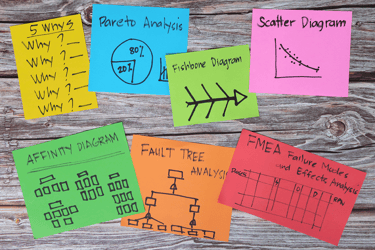The Packaging Industry's Sustainability Challenge: Why ERP Systems Are Essential for Success A straightforward guide to navigating sustainability regulations across folding carton, flexible...
Flexible Packaging Market Growth: Is Your Business Growth Ready?
The Latest research suggests that the global flexible packaging market will be worth $238.91 billion by 2029.
This growth is driven by evolving consumer preferences, technological advancements, and a heightened focus on sustainability.
Industries such as food and beverage, pharmaceuticals, and consumer goods lead this shift, creating immense opportunities for flexible packaging converters to innovate and grow.
As the market grows, success hinges on operational efficiency, customer satisfaction, and data-driven decision-making. An advanced Manufacturing Execution System (MES) system can serve as the foundation for achieving these goals, helping businesses streamline processes and adapt to market demands.
Contents
1. A data-driven approach to growth
Flexible packaging has been a driving force of innovation since the 1950s, shaping trends in sustainability, product protection, and consumer convenience. To stay competitive, companies must make informed decisions about market expansion, investments, and product offerings.
An MES system provides real-time visibility of the factory manufacturing floor. It tracks every movement of material, machine speed, accurate downtime and offers full traceability. Integrated with a an existing ERP/MIS and business intelligence tools, enables data driven key performance indicators (KPIs) across various business applications, enabling informed decision-making.
With complete plant visibility, production traceability, and awareness of evolving macro-environmental trends, businesses can prioritize investments and allocate resources strategically.
2. Enhancing sustainability and reducing waste
Flexible packaging is an eco-friendly choice because of its lightweight materials, reduced energy consumption during production, and efficient transportation. The future of flexible packaging lies in industry-wide collaboration to develop next-generation technologies that enhance sustainability, including:
- Advancements in recycling systems
- The adoption of bio-based and recyclable materials
- Better consumer education.
Companies leading the charge will be those that prioritize innovation alongside operational efficiency - a balance made possible through the implementation of an ERP system. ERP software can help converters to:
- Optimize material usage: Reducing waste during production.
- Track sustainability metrics: Monitoring energy usage and carbon footprints.
- Improve recyclability: Facilitating the use of mono-materials and other sustainable innovations.
3. Streamlining operations for greater efficiency
The flexible packaging industry thrives on agility and precision. A prime example is the $3 million facility expansion by Eagle Flexible Packaging, designed to meet growing market demands while maintaining operational excellence.
Here’s how an MES can improve operational efficiency:
- Dynamic scheduling: Optimize production capacity across multiple facilities.
- Inventory management: Ensure the right materials are available at the right time, reducing stockouts and overstocking.
- Error reduction: Automated workflows minimize human error, ensuring consistent quality.
By implementing ERP-driven processes, businesses can scale efficiently and meet customer expectations.
4. Innovating with product design and consumer appeal
Flexible packaging’s success lies in its ability to blend functionality with aesthetics. Consumers increasingly prefer sleek, compact packaging that reduces waste and enhances usability. For instance:
- 26% of online shoppers are deterred by excessive packaging, making streamlined designs crucial for brand loyalty.
- Flexible packaging is particularly popular among younger consumers and in markets like Poland and France, where 28% and 25% of consumers (respectively) favor its convenience and sustainability.
- SKU’s are increasing as consumer demand products that better match their tastes, beliefs and preferences;
MES systems empower businesses to innovate by providing tools that improve sequeincing through better scheduling to accommodate for shorter runs due to more SKUs. Another areas MES data collection helps is with recipe management, ensuring consistent quality, and enabling the creation of new, high-performing products. These innovations meet consumer demands and help strengthen the brand’s reputation.
5. Meeting industry standards and compliance
Food and pharmaceutical industries, which account for around 50% of the market, strictly adhere to safety and quality standards. Flexible packaging’s ability to meet these requirements while providing superior product protection has made it a leader in the sector.
ERP systems simplify compliance by:
- Ensuring traceability: Track materials from suppliers to finished goods.
- Managing certifications: Maintain records for audits and regulatory requirements.
- Automating quality control: Identify and address defects in real time.
This level of control is only possible with a real-time MES data collection system and essential for maintaining customer trust and avoiding costly recalls or compliance breaches.
6. Why MES Is essential for flexible packaging success
As the flexible packaging industry grows, businesses must evolve to meet rising consumer expectations and market demands. Advanced, packaging industry-specific MES offering Data Collection and Scheduling systems like ePS Packaging AC4D and PrintFlow 4D can help converters with:
- Real-time data collection: Drive smarter decisions with actionable insights.
- Advanced scheduling: Optimize production efficiency and minimize downtime.
- Compliance tools: Ensure seamless adherence to industry standards.
With these capabilities, businesses can achieve operational excellence, enhance customer satisfaction, and position themselves as market leaders.
Seizing the flexible packaging opportunity
The flexible packaging industry is a powerhouse of innovation and growth. From protecting products to promoting sustainability, it offers immense potential for businesses willing to embrace change. However, realizing this potential requires more than traditional strategies and demands cutting-edge tools like MES systems.
By integrating MES solutions into their operations, businesses can streamline processes, reduce waste, and unlock new revenue streams.
With the flexible packaging market poised for unprecedented growth, now is the time to invest in the tools and strategies that will define the industry’s future. Don’t just participate in this transformation. Lead it.




